"Cherishing Little Steps - A Haven for Baby and Family Journeys"
Essential Oils for Beautiful, Clear Skin
Imagine your skin as a canvas awaiting the masterful strokes of essential oils to reveal its true beauty. With the power to address a variety of skin concerns and enhance your complexion, essential oils have become a staple in skincare routines worldwide. But how exactly can these potent plant extracts work wonders for your skin? Let's explore the science behind essential oils and how they can help you achieve the clear, radiant skin you've always desired.
Key Takeaways
- Tea tree oil for clear skin with antibacterial properties.
- Lavender oil soothes and reduces redness for beautiful skin.
- Rosemary oil is antimicrobial, promoting clear and healthy skin.
- Lemon oil brightens skin for a radiant complexion.
- Chamomile oil calms and reduces inflammation, improving skin clarity.
Benefits of Essential Oils
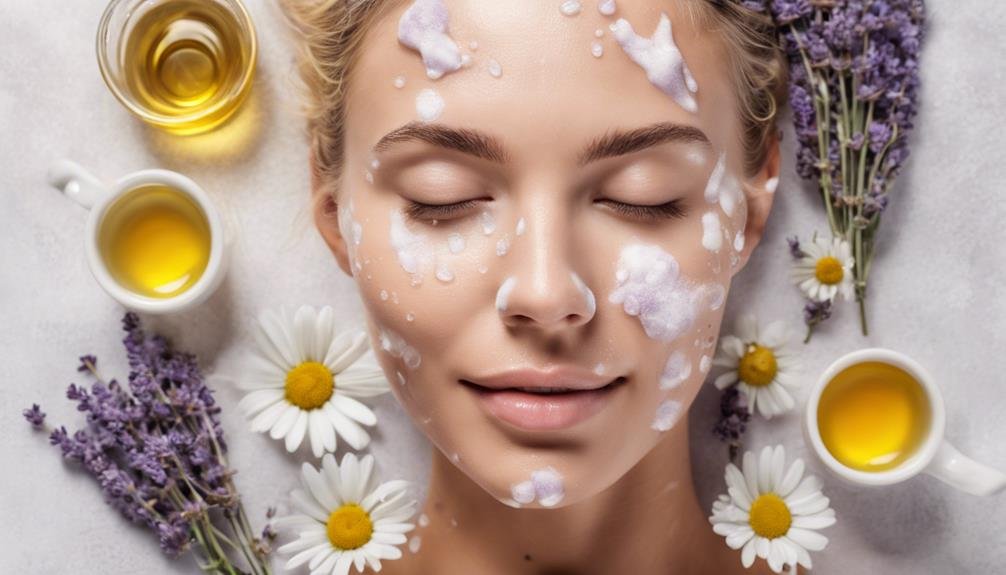
Unlock the potential of essential oils for your skin by understanding their numerous benefits. Essential oils are concentrated plant extracts known for their therapeutic properties. When it comes to skincare, essential oils offer a wide range of benefits such as anti-inflammatory, antimicrobial, and antioxidant properties. These oils can help soothe irritated skin, fight acne-causing bacteria, and protect your skin from environmental damage.
One of the key benefits of essential oils is their ability to balance oil production in the skin. Whether you have oily, dry, or combination skin, there's an essential oil that can help regulate sebum production and promote a more balanced complexion.
Additionally, essential oils can improve skin elasticity, reduce the appearance of fine lines and wrinkles, and even out skin tone.
Incorporating essential oils into your skincare routine can enhance the overall health and appearance of your skin. However, it's essential to dilute them properly with a carrier oil to prevent irritation. Always perform a patch test before using any new essential oil to ensure compatibility with your skin.
Top Essential Oils for Acne
Exploring the realm of skincare solutions, essential oils stand out as potent allies in the battle against acne. When it comes to combating pesky breakouts, some essential oils have shown promising results.
Tea tree oil, with its powerful antibacterial properties, can help reduce inflammation and kill acne-causing bacteria.
Lavender oil is known for its soothing effects on the skin, helping to calm redness and irritation associated with acne. Additionally, the anti-inflammatory and antimicrobial properties of rosemary oil make it a popular choice for treating acne and promoting clearer skin.
Another effective essential oil for acne is lemon oil, which contains citric acid known for its exfoliating properties that can unclog pores and prevent new breakouts.
Lastly, the gentle chamomile oil can help soothe sensitive skin while reducing acne inflammation. When using essential oils for acne, remember to dilute them properly and perform a patch test to ensure compatibility with your skin.
Anti-Aging Properties of Oils

When considering skincare solutions, the anti-aging properties of various oils come to the forefront as potent allies in promoting youthful skin. Essential oils offer a natural and effective way to combat the signs of aging, helping you maintain a radiant and youthful complexion. Here are three key benefits of using oils for anti-aging:
- Antioxidant Protection: Oils like rosehip, pomegranate, and carrot seed are rich in antioxidants that help fight free radicals, reducing the appearance of wrinkles and fine lines.
- Hydration and Nourishment: Oils such as argan, jojoba, and avocado deeply hydrate the skin, improving elasticity and firmness for a more youthful look.
- Collagen Boosting: Certain oils like frankincense, myrrh, and rosemary stimulate collagen production, aiding in skin renewal and reducing sagging.
Incorporating these oils into your skincare routine can help address common signs of aging, leaving your skin looking rejuvenated and vibrant.
Essential Oils for Brightening Skin
Harnessing the power of essential oils for brighter skin can be a game-changer in your skincare routine. Essential oils are packed with antioxidants and nutrients that can help even out skin tone, reduce dullness, and promote a radiant complexion. When looking to brighten your skin naturally, certain essential oils stand out for their effectiveness. Here are some essential oils known for their skin-brightening properties:
| Essential Oil | Benefits |
|---|---|
| Lemon | Evens out skin tone and boosts radiance |
| Frankincense | Helps reduce dark spots and blemishes |
| Carrot Seed | Rich in antioxidants for a glowing complexion |
| Rose | Hydrates and brightens for a youthful glow |
These essential oils can be diluted with a carrier oil like jojoba or coconut oil and applied topically to reap their brightening benefits. Remember to do a patch test before using any new essential oil to ensure compatibility with your skin.
Healing Oils for Scars
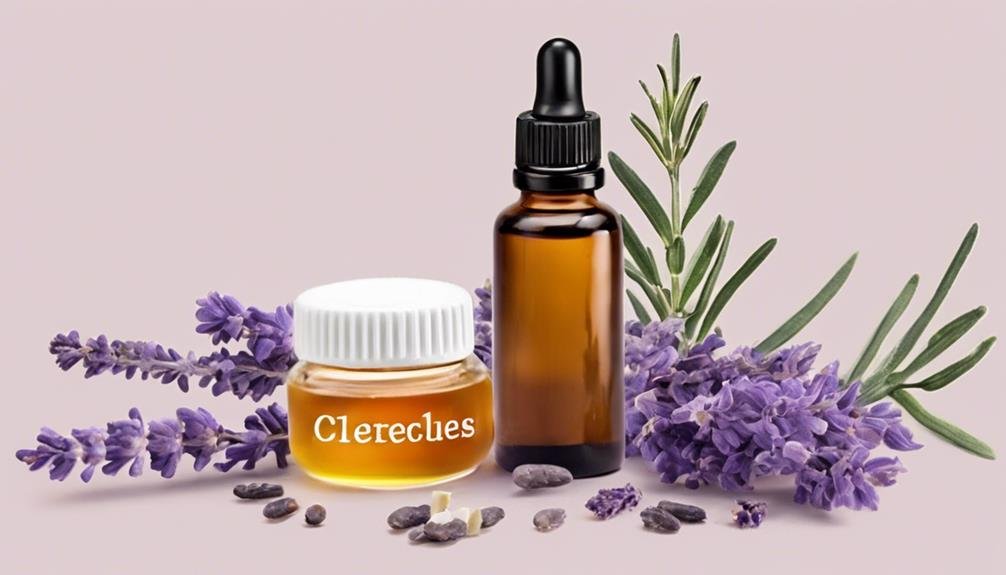
To address scars effectively, incorporating healing oils into your skincare regimen can make a significant difference in promoting skin repair and rejuvenation. Scars can be a constant reminder of past wounds or acne, but with the right oils, you can help diminish their appearance and encourage skin healing. Here are some healing oils that can aid in scar reduction:
- Lavender Oil: Known for its soothing properties, lavender oil can help reduce the visibility of scars and promote skin regeneration.
- Rosehip Seed Oil: Rich in essential fatty acids and antioxidants, rosehip seed oil is effective in improving skin texture and reducing the appearance of scars.
- Frankincense Oil: This oil has been used for centuries for its skin healing properties and can contribute to fading scars over time.
Incorporating these healing oils into your skincare routine can provide your skin with the nourishment it needs to heal and repair, ultimately leading to smoother and more even-toned skin.
Balancing Oils for Combination Skin
Balancing oils play a crucial role in managing combination skin, which is characterized by both oily and dry areas on the face. When dealing with this skin type, it's essential to find oils that can hydrate dry patches without exacerbating oiliness in other areas.
Look for lightweight oils like jojoba oil, which closely resembles the skin's natural sebum and can help regulate oil production. Rosehip oil is another excellent option as it's rich in essential fatty acids that nourish dry skin while being non-comedogenic, meaning it won't clog pores in oily areas.
Tea tree oil is known for its antibacterial properties and can be beneficial for controlling excess oil and preventing breakouts in oily zones. Additionally, geranium oil is great for balancing both dry and oily areas, making it a versatile choice for combination skin.
Remember to patch test any new oil to ensure compatibility with your skin. By incorporating these balancing oils into your skincare routine, you can achieve a harmonious complexion that's both hydrated and clear.
Soothing Oils for Sensitive Skin
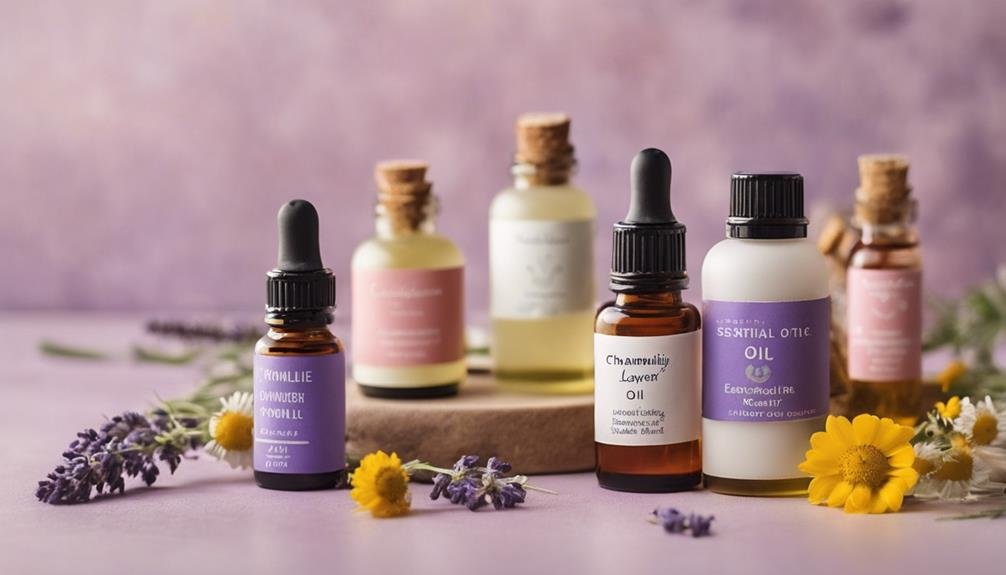
Utilizing the calming properties of essential oils can be a beneficial approach for individuals with sensitive skin. Essential oils have been known for their soothing effects on sensitive skin, helping to reduce redness, irritation, and inflammation.
Here are three soothing oils that can work wonders for your sensitive skin:
- Chamomile Oil: Chamomile is renowned for its anti-inflammatory and calming properties, making it an excellent choice for sensitive skin. It can help alleviate irritation and redness, promoting a more even skin tone.
- Lavender Oil: Lavender oil isn't only calming for the mind but also for the skin. Its anti-inflammatory and antibacterial properties can help soothe sensitive skin while promoting a sense of relaxation.
- Rosehip Oil: Rich in essential fatty acids and antioxidants, rosehip oil is deeply hydrating and gentle on sensitive skin. It helps to nourish and repair the skin barrier, reducing sensitivity over time.
Incorporating these soothing oils into your skincare routine can help provide relief and improve the overall health of your sensitive skin.
Oils for Hydrating Dry Skin
For individuals struggling with dry skin, incorporating oils into their skincare routine can provide much-needed hydration and nourishment. When it comes to hydrating dry skin, certain oils stand out for their ability to deeply moisturize and restore skin health.
- Jojoba oil, rich in vitamins E and B, closely resembles the skin's natural oils, making it an excellent choice for hydration without clogging pores.
- Argan oil, packed with essential fatty acids and antioxidants, helps to repair the skin barrier and lock in moisture.
- Sweet almond oil, high in vitamin E and fatty acids, is known for its emollient properties that soften and soothe dry skin.
- Lastly, rosehip oil, abundant in vitamins A and C, aids in improving skin texture and promoting a radiant complexion.
Incorporating these hydrating oils into your skincare routine can help combat dryness, leaving your skin looking and feeling beautifully nourished.
Oils for Oily Skin
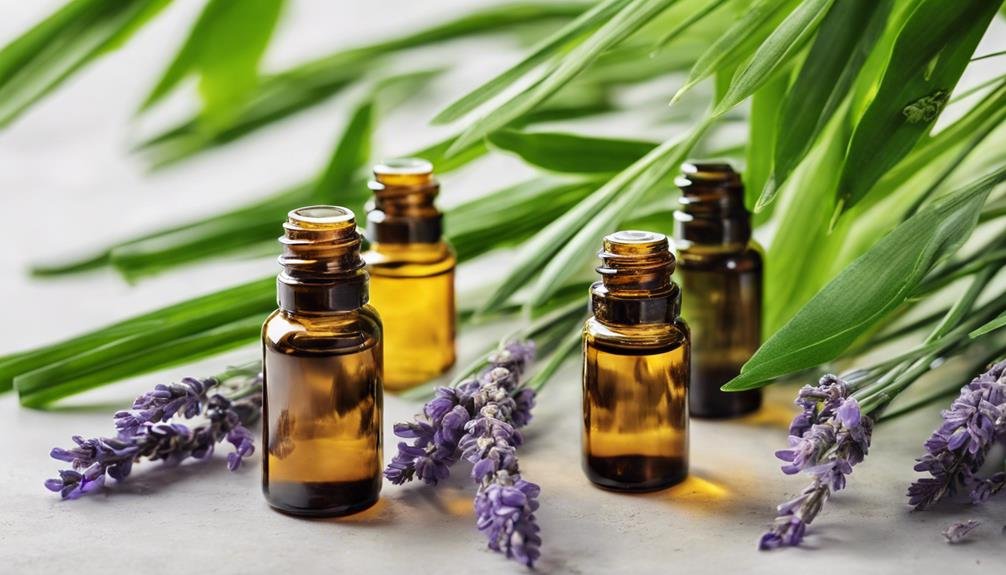
When managing oily skin, selecting the right oils can be crucial in maintaining a balanced complexion. Oily skin is often a result of overactive sebaceous glands, leading to excess oil production. However, using the appropriate oils can help regulate sebum production and promote healthier skin. Here are some oils that can benefit oily skin:
- Jojoba Oil: Known for its similarity to the skin's natural oils, jojoba oil can help balance oil production without clogging pores.
- Tea Tree Oil: With its antibacterial properties, tea tree oil can help combat acne and control excess oil on the skin.
- Grapeseed Oil: Lightweight and non-comedogenic, grapeseed oil moisturizes the skin without leaving a greasy residue, making it suitable for oily skin types.
These oils can be incorporated into your skincare routine to help manage oiliness and maintain a clear, balanced complexion. Remember to patch test any new oil before using it widely on your face to ensure compatibility with your skin.
Essential Oils for Even Skin Tone
To achieve an even skin tone, incorporating essential oils into your skincare regimen can be beneficial. Essential oils have properties that can help reduce hyperpigmentation, dark spots, and uneven skin tone, giving you a radiant complexion.
- Lavender essential oil is known for its skin-soothing properties and can help even out skin tone by reducing redness and blotchiness.
- Frankincense essential oil is another excellent choice for promoting an even skin tone, as it can help fade scars and dark spots while rejuvenating the skin.
Rosehip essential oil is rich in vitamins A and C, which are known to brighten the skin and improve overall skin tone. It also helps with skin regeneration and can promote a more even complexion.
Incorporating these essential oils into your skincare routine can help target specific skin concerns related to uneven skin tone, revealing a smoother and more balanced complexion.
Detoxifying Oils for Clear Skin
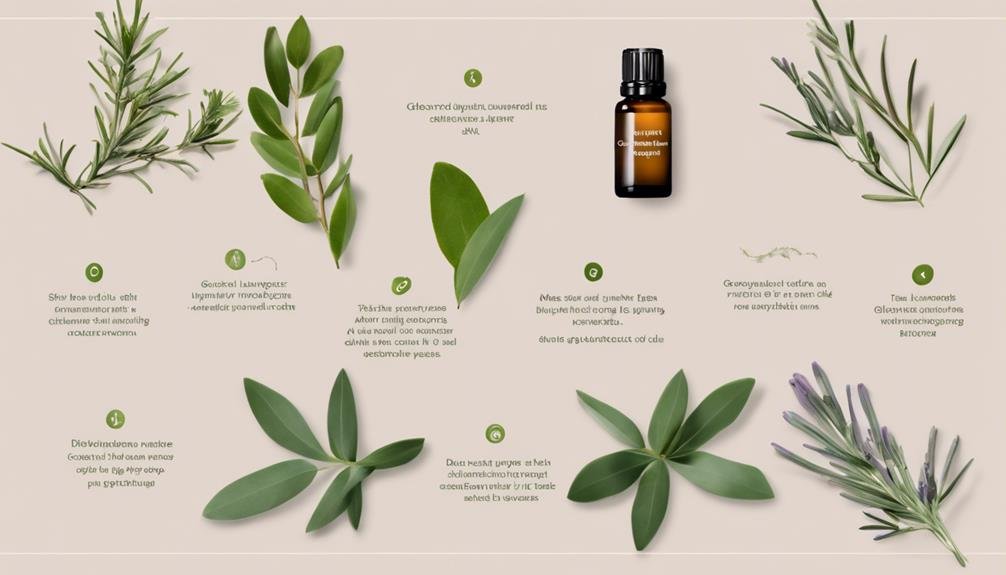
Detoxifying oils play a crucial role in maintaining clear and healthy skin. These oils are known for their ability to draw out impurities, unclog pores, and promote a rejuvenated complexion. When incorporated into your skincare routine, detoxifying oils can help you achieve a radiant and blemish-free skin that you desire.
Here are three key benefits of using detoxifying oils:
- Purifying Properties: Detoxifying oils such as tea tree oil and eucalyptus oil possess purifying properties that can help eliminate toxins and bacteria from the skin, reducing the likelihood of breakouts.
- Balancing Sebum Production: Certain detoxifying oils like lavender oil and juniper berry oil can help regulate sebum production, preventing excess oiliness that can lead to acne.
- Anti-Inflammatory Effects: Oils like chamomile and rosehip oil have anti-inflammatory effects, soothing redness and irritation while promoting a calmer complexion.
Integrating these detoxifying oils into your skincare regimen can work wonders for maintaining clear and glowing skin.
Incorporating Oils Into Skincare Routine
Enhance the effectiveness of your skincare routine by seamlessly incorporating oils that cater to your skin's specific needs. Oils can be a valuable addition to your skincare regimen, providing nourishment, hydration, and protection. Before incorporating oils, identify your skin type and concerns to select the most suitable options.
For dry skin, opt for oils like argan or marula that offer intense hydration. Those with oily skin can benefit from lighter oils such as jojoba or tea tree, which help balance sebum production. Sensitive skin types may find relief with calming oils like chamomile or lavender.
To use oils effectively, apply a few drops to damp skin after cleansing to lock in moisture. You can also mix a drop or two into your moisturizer for added benefits. Experiment with different oils to find what works best for your skin, and remember to patch test before full application to avoid any adverse reactions.
Frequently Asked Questions
Can Essential Oils Be Used Directly on the Skin?
Yes, essential oils can be applied directly to the skin. However, it's crucial to dilute them properly to avoid skin irritation. Conduct a patch test first and consult with a dermatologist if you have sensitive skin.
Are Essential Oils Safe to Use During Pregnancy?
During pregnancy, it's best to consult your healthcare provider before using essential oils. Some oils can be safe in moderation, but others may pose risks. Always prioritize your baby's health and well-being.
How Do I Know if I Am Allergic to a Specific Essential Oil?
If you suspect an allergic reaction to an essential oil, cease use immediately. Symptoms like redness, itching, or swelling can indicate a reaction. Consult a healthcare provider for guidance. Always perform a patch test before full application.
Can Essential Oils Help With Hormonal Acne?
Yes, essential oils can assist in managing hormonal acne. Tea tree oil, lavender, and clary sage have anti-inflammatory and antibacterial properties that may help reduce breakouts. It's crucial to dilute and patch test before use.
Are Essential Oils Safe for Children to Use on Their Skin?
Yes, essential oils can be safe for children's skin, but caution is crucial. Always dilute properly, choose kid-friendly oils like lavender or chamomile, and do a patch test first. Consult a pediatrician or aromatherapist for guidance.
Conclusion
Incorporating essential oils into your skincare routine is like adding a touch of magic to your daily regimen. These powerful oils work wonders to combat acne, soothe sensitive skin, and promote a radiant complexion. With their anti-inflammatory, antimicrobial, and antioxidant properties, essential oils like tea tree, lavender, and rosemary can help you achieve healthier, clearer skin that looks and feels rejuvenated. So go ahead, indulge in the beauty of essential oils for beautiful, clear skin.

